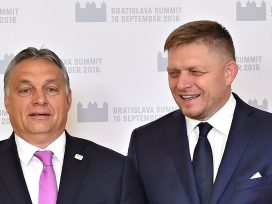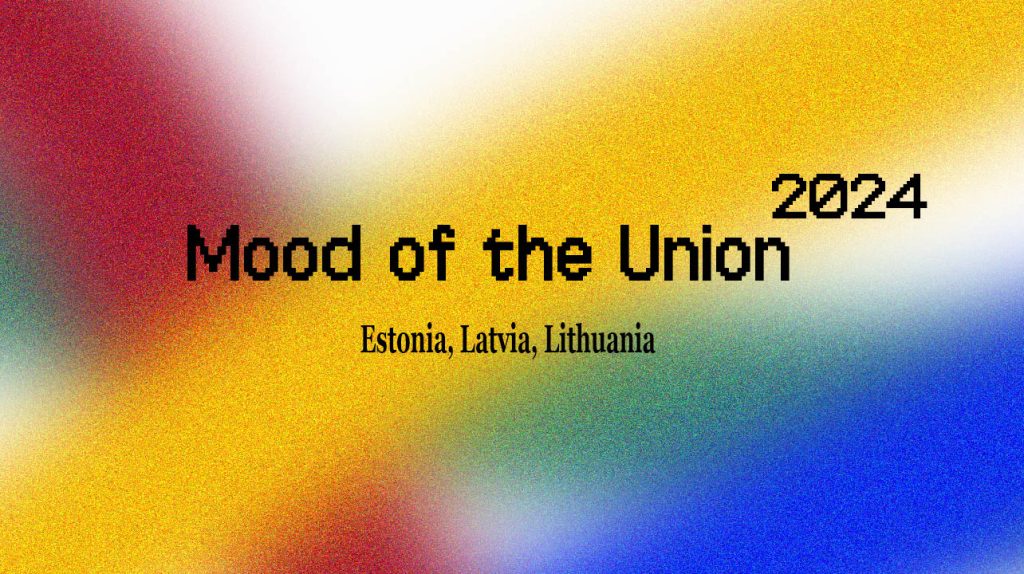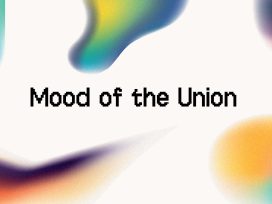Discontent with ruling parties pervades the Baltic States, bolstering the chances of rightwing populists across the region in the European Parliament elections. Yet the security concerns caused by the ongoing threat from Russia hold Euroscepticsm within bounds.
In all three Baltic states, the ubiquitous gloom stemming from Russia’s ongoing threat has firmed up the view of the European Union (EU) and NATO as guarantors of national security ahead of the 2024 European Parliament elections in early June. The result? Fewer eurosceptics and what is expected to be a larger than usual turnout on 9 June.
According to a Eurobarometer survey from April 2024, defence and security are the top issues for most Baltic voters, as a result of the EU’s perceived tough stance on Russia and the Baltic countries’ blood-stained history with their imperial neighbour.
A second topic of importance is migration. In 2021, Lithuania and Latvia experienced an influx of illegal migrants, who arrived via Belarus having been displaced by Lukashenka’s increasingly authoritarian regime. Some in the Baltic States said the EU and the EP were slow to react. The recent adoption of the Migration and Asylum Pact (MAP) improved the EP’s reputation tangibly. Lithuania’s interior minister Agne Bilotaite praised it as ‘a historic day for us and a huge achievement in EU migration policy’.
But apart from this, it is a case of different constituencies with dissimilar priorities. For many Baltic farmers, an acute issue is low food prices, smaller EU subsidies than EU member states in western Europe, and the impact of proposed environmental regulations (such as a carbon tax, pesticide bans, nitrogen emissions curbs, and restrictions on water and land usage). Trade in agricultural products with non-European Union member states, such as Ukraine and the Mercosur bloc of South America, is another key area of concern for farmers. For many local haulers, meanwhile, the most important issue is the unsettled nuances of the EU’s Mobility Package, a major overhaul of road transport rules that Lithuania and eastern members had opposed.
In the 2024 European Parliament elections in the Baltics States, the number of MEP mandates will likely shift to the right, with populist radical right parties expected to make gains and in some win seats for the first time.
Lithuania: Nationalist party spreads its wings
According to the Eurobarometer survey, defence and security issues matter most to 60 percent of Lithuanians ahead of the EP elections. This is the highest in the EU; Finns were the second most likely to mention this topic, followed by Denmark, Latvia, the Czech Republic and Poland.
This emphasis on security reflects Lithuania’s historical trauma caused by Soviet atrocities and current concerns over Russian threats to independence, compounded by effective communication from the Conservative-Liberal government.
Lithuania’s strong trust in the EU, indicated by a 91 percent approval rating, likely fuels desires for increased EU influence. But despite this support, the historically low turnout in Lithuanian EP elections suggests that enthusiasm for the EU does not necessarily translate into high voter participation. The last time the EP elections were held separately from presidential elections in Lithuania was in 2009. Then, only one-fifth of voters went to the polls, and turnouts in the subsequent EP elections were under 40 per cent. Yet in March 2024, against the backdrop of war in Ukraine, more than two-thirds of Lithuanian residents said that they would vote in the EP elections, showing a growing interest of the pan-European election.
The Central Electoral Commission has approved seventeen Lithuanian political parties and formations to participate in the EP elections. Traditionally, four or five parties secure 11 mandates in the European Parliament. The centre-right Homeland Union (TS-LKD), the orchestrating party of the ruling bloc with three MEPs in the current parliament, is expected to win two or three seats.
However, TS-LKD faces declining popularity, dropping 3.9 percentage points in recent polls, and ranking fourth. The Lithuanian Social Democratic Party (LSDP) leads with 20.3 percent support. Several factors contribute to TS-LKD’s decline, including unpopular decisions during the COVID crisis and the conflict in Ukraine. The government’s failure to implement tax reform, despite pressure from the European Commission, has also caused dissatisfaction.
In foreign policy, the Lithuanian government has unilaterally, and without the approval of the European Union, allowed Taiwan to open its representation in the capital Vilnius, under the name The Taiwanese Representative Office, an upgrade from the previous status – Taipei Mission, a common name in most EU capitals.
This has strained relations with China, which recalled its ambassador and sanctioned Lithuania by impeding existing business links. Many Lithuanian businesses, and entire sectors (such as dairy), have suffered greatly as a result.
Some Lithuanian businesses are also irked by the TS-LKD-led government’s decision to halt the export of Belarusian potash fertilizer through Klaipeda port, resulting in substantial losses for Lithuanian railways and the port. At the same time, the sales volumes and profits of Russia’s Uralkaly potash fertiliser have increased a dozen of times over.
Against this backdrop, TS-LKD’s electoral chances should be assessed cautiously. Heavyweight TS-LKD MEPs Andrius Kubilius – Lithuania’s Prime Minister from 2008 to 2012 and party chairman – and Rasa Jukneviciene, Lithuania’s former defence minister, are likely to retain their seats. But TS-LKD faces dissatisfaction among voters. What could work in the party’s favour is its disciplined voter base, which might choose loyalty on election day.
The opposition Lithuanian Social Democratic Party (LSDP), led by MEP Vilija Blinkeviciute, aims for at least two EP mandates, potentially benefiting from high public support. Other opposition parties, such as the Lithuanian Farmers and Greens Union (LVZS) and the Union of Democrats ‘In the Name of Lithuania’ are also expected to secure seats.
The National Alliance (NS), Lithuania’s sole far-right party, could secure one seat in the European Parliament, though its chances appear slim. However, the party’s true popularity might be underestimated due to reluctance among some voters to disclose nationalist leanings, influenced by media bias towards liberal perspectives.
Discontent, particularly among rural and less educated demographics, stems from concerns over increased migration, rising living costs, and perceived promotion of non-traditional family values in education. Vytautas Sinica, an NS co-founder and political analyst, actively engages with the public through social media and personal meetings. The party’s campaign focuses on anti-European sentiments and promotes an anti-European agenda, opposing immigration, ideological censorship, LGBTQ+ advocacy, environmental extremism and perceived discrimination against Lithuanian farmers.
Estonia: Far-right parties smell victory
In Estonia, 73 candidates from nine political parties and six independent candidates will vie for Estonia’s seven seats in the EP.
For a long time, the biggest question was if Estonian Prime Minister Kaja Kallas, chairwoman of the ruling liberal Reform party, would stand as an MEP. But Kallas, who was also seen as a potential secretary general of NATO, decided to focus on her duties as Prime Minister. Particularly pressing is the country’s bad economic streak, for which Kallas and her party are considered responsible.
Estonia’s leading pro-EU party, Reform faced a sharp decline in popularity under Kallas due to proposed tax hikes amid economic struggles. Her husband’s ties to Russia were also costly to her reputation. Despite traditionally stringent fiscal policies, Estonia has seen rising budget deficits and debt under the current government, with social spending to alleviate the energy crisis and boost defence spending. All this has led to discontent among citizens.
Economic woes may in turn bolster the electoral prospects of the rightwing populist Conservative People’s Party of Estonia (EKRE), a member of the Identity and Democracy Group, and Isamaa (European People’s Party/EPP) – some of the most successful of their kind in the Baltic States.
EKRE’s success can be attributed to rising social inequality and economic insecurity. As elsewhere, many Estonians feel ‘left behind’ and do not consider themselves the losers in this ‘brave new globalizing world’. The Estonian population also tends to be more conservative and to have more entrenched traditional values than voters in the more progressive Latvia and Lithuania.
Tim Haughton and Kevin Deegan-Krause, two political scientists specialized in eastern Europe, have argued that successful and electorally persistent parties usually do three things: develop strong and geographically extensive party organizations; represent one or more major social cleavage in a given society; and have capable leaders. EKRE ticks all these boxes.
Over the last decade, the Helme brothers (Mart and Martin), the leaders of EKRE, have built a party that rests on strong organizational foundations, and have formulated one of the major new, mobilizing cleavages in Estonian politics. They themselves radiate charisma and political willpower, and EKRE is a political force to reckon with – now and for years to come.
EKRE, now the second most popular party in Estonia, aims to send Martin Helme to Brussels. Prioritizing Estonian sovereignty within a union of nation-states, its platform opposes further power centralization in Brussels. Helme emphasizes the need to regain sovereignty, strengthen border control, counter green extremism, and uphold freedom of expression – all positions that resonate with many Estonians.
Latvia: Cautious Eurosceptics
According to Eubarometer, 76 percent of Latvians agree that voting is increasingly crucial in the current geopolitical climate, underscoring the growing importance of political participation.
The EP elections are renowned for being a battleground of political heavyweights, and a posting in Brussels is often seen as a reward before retirement. Since governments typically change in Latvia every two years, the longer-term nature of EP mandates, lasting five years, seems to offer a more stable environment. But some politicians, feeling they have exhausted opportunities in Latvia, also seek new challenges in the EP. In Latvia this year, former prime ministers, mayors of the capital Riga and ex-ministers are all running, adding to the electoral excitement.
The ruling Coalition, comprising centre-right New Unity, the agrarian The Union of Greens and Farmers, and the leftwing Progressives, appears to have an advantageous position in securing EP mandates. However New Unity, the leading party within the Coalition, finds itself embroiled in controversy. One scandal involves former prime minister Krisjanis Kariņš, who resigned for allegedly using budget funds to cover expenses for private flights during his tenure. The matter has prompted Latvia’s prosecutor general to initiate criminal proceedings. New Unity faces additional scrutiny after former employees alleged they were paid off-the-books, further tarnishing the party’s reputation ahead of the elections.
The Union of Greens and Farmers espouses conservative principles, emphasizing the primacy of national policies and politics, especially regarding farming issues. This message resonates strongly with rural voters. Despite its conservative stance, the party cannot be deemed ‘extreme’ and has never spoken against Latvia’s membership in the EU.
This is not the case for the National Alliance, a right-wing populist party that enjoys popularity in rural areas with a less educated voter base. While opposing the delegation of more national rights to the EU, the party does not advocate for leaving the Union outright. A Eurosceptic programme is also offered by Latvia First, led by oligarch Ainers Slesers, which has emerged as a new populist right-wing party with a critical stance toward further integration of Latvia into the bloc. Notably, however, the party has not explicitly called for Latvia’s withdrawal from the EU.
The upcoming EP elections in Latvia are seen as a litmus test for parties gearing up for general and municipal elections. With 271 candidates from 16 lists vying for nine EP seats, notable figures include Valdis Dombrovskis (New Unity), currently serving as Executive Vice President of the European Commission and European Commissioner of Trade, along with former Riga mayors Martins Staķis (The Progressives) and Nils Usakovs (Social Democratic Party ‘Harmony’).
Despite allegations of corruption against Usakovs and MEP Andris Ameriks, both retained their MEP immunity and the EP opted against revoking it. However, former MEP Tatjana Zdanoka (Latvian Russian Union) is absent from the roster following allegations of ties to Russia’s Federal Security Service, detailed in leaked emails. Zdanoka’s purported role involved fostering pro-Kremlin sentiment in the Baltic region and soliciting funds from Russian sources for political activities. She denies involvement.
The lingering question in Latvia, akin to Lithuania and Estonia, revolves around voter turnout. This is historically low, with just 33 percent in 2019 and even lower in 2014 at 30.2 percent. However, amidst current geopolitical tensions, there is a potential for significant change. Recent Eurobarometer surveys indicates a notable shift, with nearly two-thirds of Latvian residents expressing their intention to vote on 9 June. This is close to the EU average of 71%.
Prospects
Discontent with ruling parties pervades the Baltic States, even if Latvia’s new government presents a potential exception. This situation bolsters the chances of opposition parties, especially on the far-right, across the region. To look out for in particular are Estonia’s national right parties, EKRE and Isamaa, as well as Lithuania’s National Unification party, which could exceed current expectations and achieve a significant outcome.
Published 27 May 2024
Original in English
First published by Eurozine
© Linas Jegelevicius / Eurozine
PDF/PRINTIn collaboration with
In focal points
Newsletter
Subscribe to know what’s worth thinking about.
Related Articles

Europe is facing not only Orbán’s autocratic turn but also that of his ‘apprentice’: Slovakia’s prime minister, Fico, has taken an advanced course in attacking his country’s judiciary, media and cultural institutions. His first goal: to get away with it, say beleaguered intellectuals, theatre directors, political scientists and investigative journalists from Bratislava.

Republic transformed
Politics and media in France
The successful campaign of the Republican Front against the mainstreaming of the far-right proved that France’s ultra-conservative media, though on the ascendant, are still not hegemonic.







